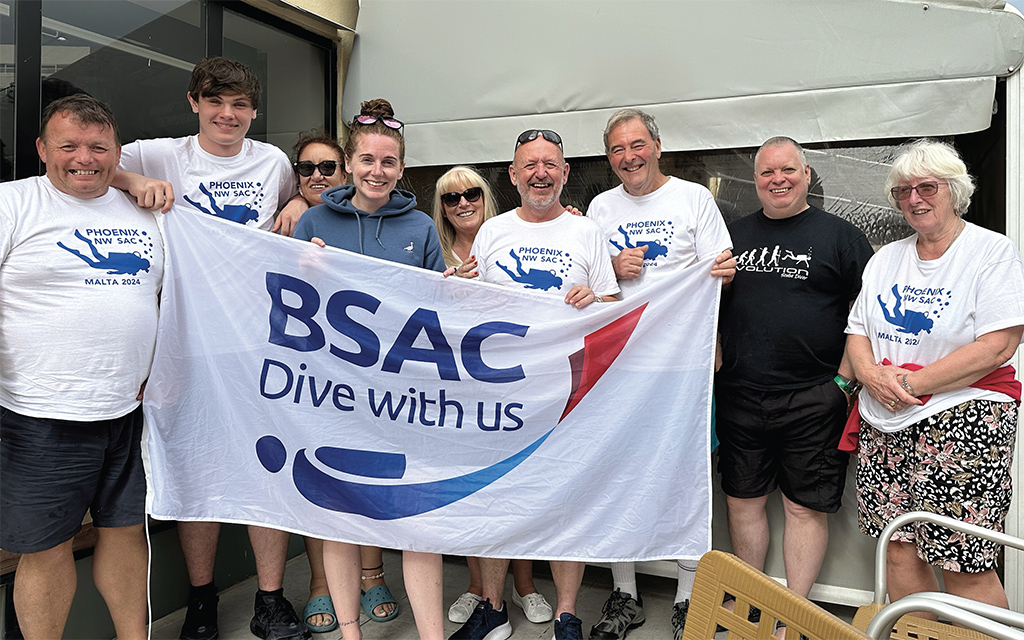
Phoenix NW Sub Aqua Club is on a roll, growing its membership and providing a family-friendly club environment. Interview by Kristina Pedder.
Where in the UK are you?
The club is based in Skelmersdale, West Lancashire. We meet at the town’s Nye Bevan swimming pool at 8pm on Wednesdays; it has a great deep end that goes down to 3.4m. We use the pool as a base for our theory training too. We go to Eccleston Delph or Capernwray for sheltered water training.
Who are your members?
We currently have 30 members, 11 of them are under-18s. At present we have three Advanced Divers, seven Dive Leaders, one Sports Diver, seven Ocean Divers and another 11 Ocean Diver trainees who should have completed their open water training by September. Also, there is one snorkel member. We have a core of experienced divers, the group of long-standing members who form the lifeblood of any club, giving continuity of diving and training. Many of them are involved in instructing and admin roles.
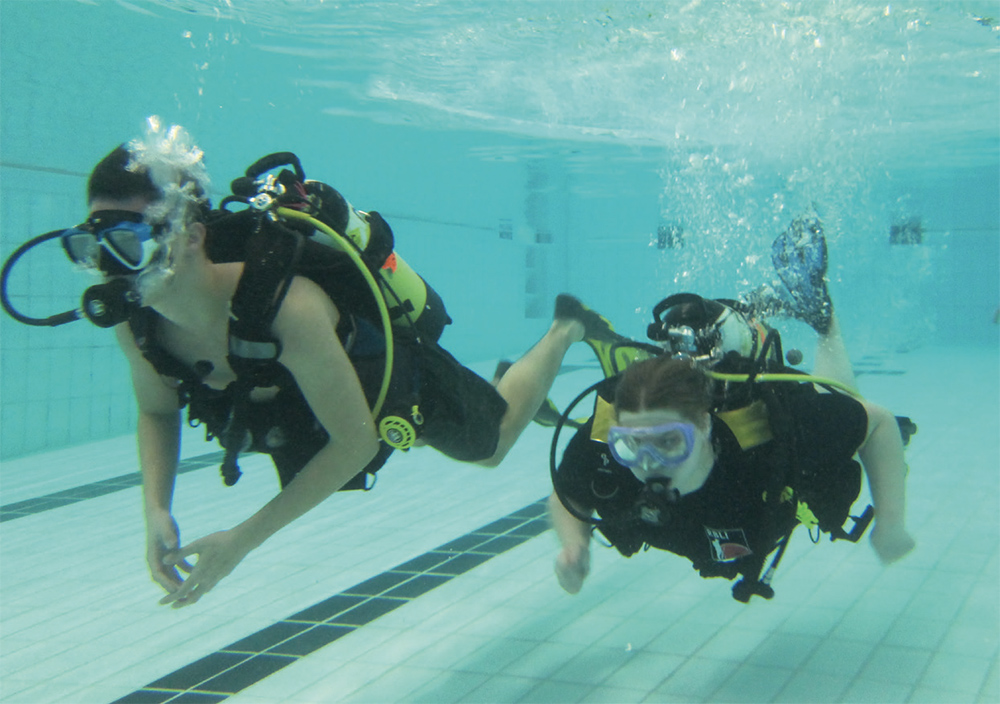
That’s a healthy cohort of under-18s. How does the club find new members?
We have used the BSAC website’s club finder and contact page, social media and word of mouth to attract new members, but we haven’t targeted younger divers particularly. Most of our young divers, and indeed adults come to us through BSAC. We have had a good uptake both for Ocean Diver and Discovery Diver, which is aimed at 10 to 12-year-olds.
How do you help younger members participate in what can be an expensive sport?
We do our best as a club to make learning to dive as affordable as possible for all new members. We do suggest that all new members purchase a mask to ensure proper fit, but it is club policy for members to use Phoenix scuba equipment and not to buy more expensive elements of kit until they have completed Ocean Diver training and are sure they want to carry on diving.
We secured a grant from Sport England more than 10 years ago, for £10,000, and we purchased 10 sets of regulators, BCDs and cylinders with it.
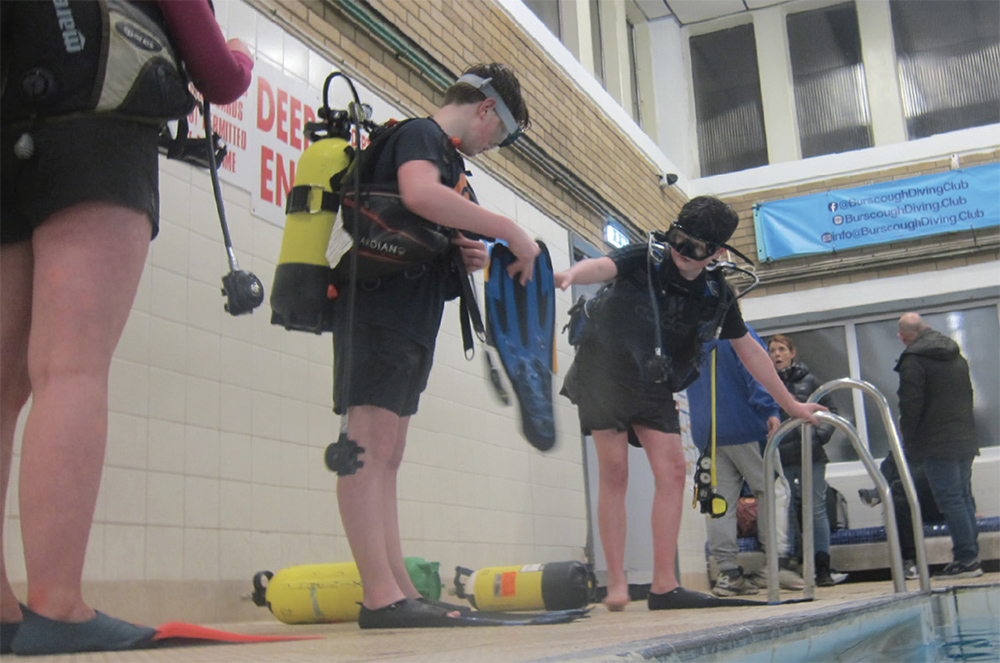
What about your membership fees?
Unfortunately, due to costs of pool hire and servicing, and lower membership numbers, we have been forced to increase our annual fee to £180 for adults, and £90 for under-18s and full-time students. The committee knows times are hard and has decided to ask for three months up front rather than the whole year’s payment, and then offer a choice of monthly or quarterly payments after that. It does include unlimited air fills, as we have our own compressor.
You are an early adopter of the new Discovery Diver course, how’s that going?
It’s been popular, but younger divers have some unique difficulties. It’s good that our pool training sessions finish at 9pm; not too late when there’s school the next day. We have had to invest in smaller kit: five smaller second-hand BCDs for the pool and two new ones for open-water use. We have some 10-litre cylinders so that the younger trainees carry less weight in their early training.
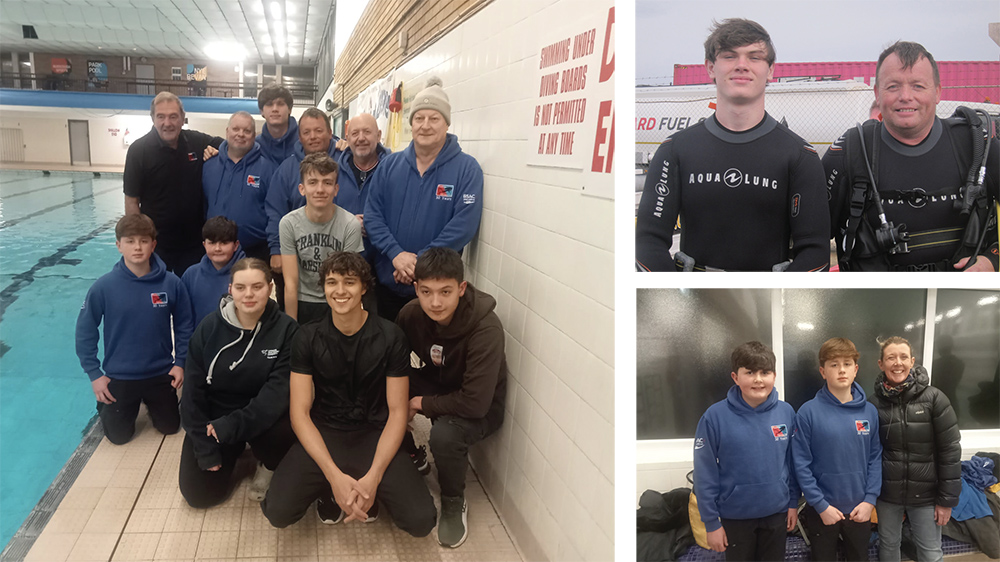
What about dive suits?
When they progress to open water, parents accept the cost of hiring equipment such as drysuits, which is an additional expense but is a more economical option for early experiences - and growing kids. Once they commit to continuing with diving, even younger members are expected to invest in the more-pricey elements of scuba gear.
How do you adapt your training for younger members?
Theory and skill sessions are taken more slowly. Each lesson is completed over two hour-long sessions. Theory training is done with BSAC materials interspersed with video clips from club trips to give visual examples of what divers can see underwater. Additional sessions and extra one-to-one sessions are used where needed, particularly with drier subjects such as learning to use dive tables. Learning is constantly reinforced by practising basic skills in addition to the BSAC lesson plans. We’ve also needed to be flexible with additional catch-up sessions to fit in with other demands on youngsters and their parents. One family has three children training and another two waiting in the wings. The parents are looking to join too; they’ve done some diving in the past and want to dive as a family in the future.
What processes do you have in place for the children?
Parents are always expected on site where students are under 16. We also have two safeguarding officers, one male, one female, and both are checked via BSAC’s Disclosure and Barring Service (DBS) for England and Wales scheme, at no cost to the club. All club instructors are also being DBS checked, following BSAC guidelines.
How do parents react to having to be present?
Our parents are happy to watch their children in the water, chat with instructors and other members and sometimes take the opportunity to swim with younger siblings. Parents have happily embraced the idea of being part of the club and supporting their children’s training.
Niamh Gribbon, one of the parents says:
The kids love diving, they’re always keen to come down to the club; they are encouraged to be responsible for their own kit and buddy checks (with oversight) and it makes them feel really grown up and responsible.
We trust the instructors implicitly, both in the pool and in open water. It’s the one time we have no control over things they do and we’re not worried when we see them disappear under the water. The instructors always explain what they’re going to do before they start and we’re confident that they’re in safe hands.
Paul Wilkes, another parent, says his son’s confidence has come on in leaps and bounds.
He’s tried lots of hobbies, but this is the only one he’s stuck at. The instructors are very friendly and understanding and John loves the community and the fun they have when they’re not training.
He enjoys learning with his peers and he loves the days when they go out to Capenwray. The family are always made welcome wherever we go.
Do you set up pool training any differently?
Pool training is generally done in pairs, as with adults, one instructor to two students, but one to one is used where students have additional needs. Sheltered water training for the under-18s is different: it takes place with one student to two adults: that’s one instructor, one student and one experienced diver who could be an assistant instructor, to ensure safety cover for the instructor. This needs a whole-club effort both in the water and out, helping to kit-up and manage dives. Open-water sessions at Capernwray have also become an enjoyable social opportunity for members, trainees and their parents and families.
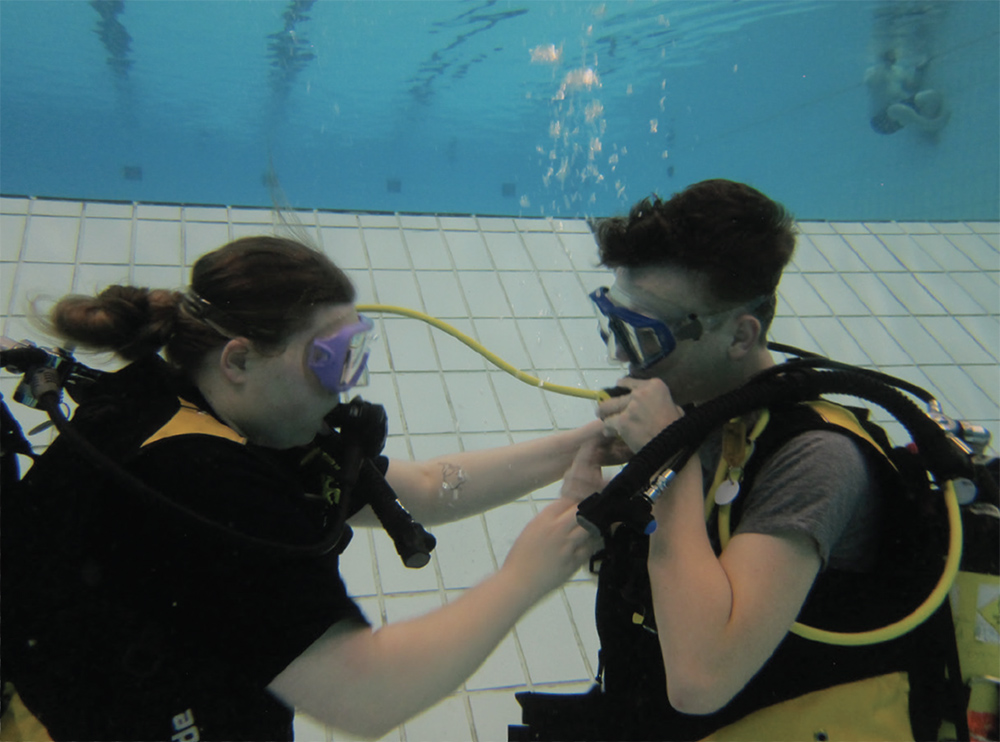
What about water conditions during training dives?
In our experience, younger divers seem to be more excited by open water and less daunted by issues such as visibility. We have arranged our under-18 open-water training in the warmer weather, so far, as the youngsters seem to feel the cold more and as they have to hire their dive suits they aren’t always the best fit.
What training do you alongside Ocean and Discovery Diver?
The club will be running a Sports Diver course during the autumn. To help our members develop their diving skills, we run some skill development courses in-house. Once suitably qualified, our younger members develop their experience and training alongside adults and on normal club trips.
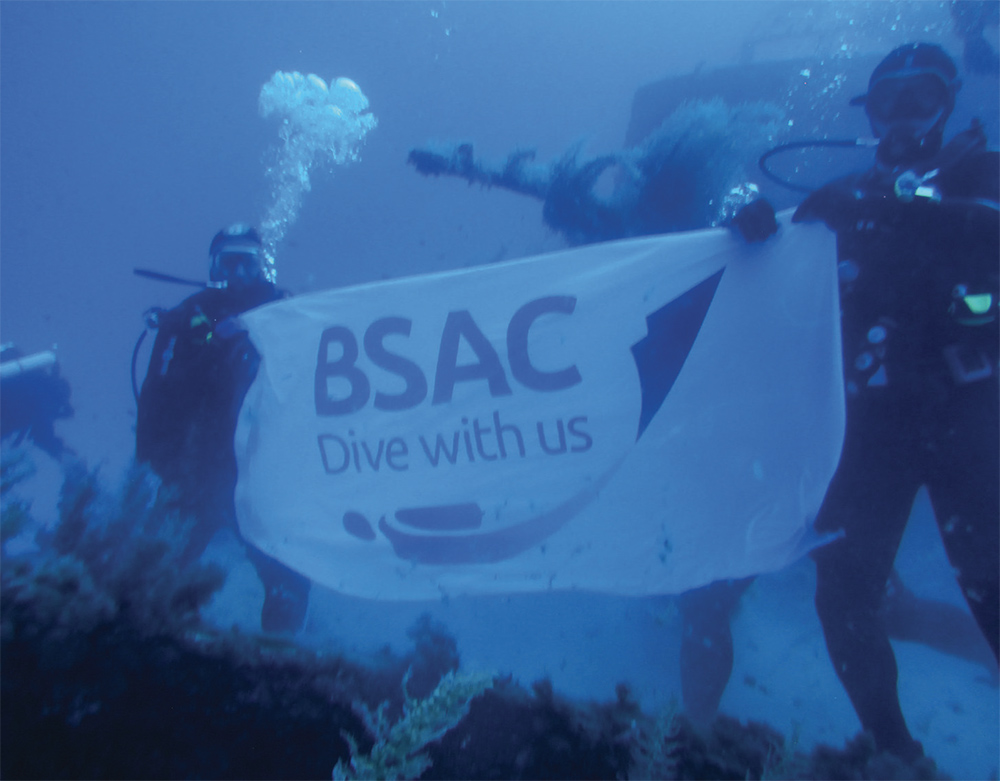
What sort of club trips do you run?
We dive from the shore and from charter boats. We organise camping trips to involve families as well and this helps to keep the cost down. In addition to training at Capernwray and Eccleston Delph, we visit Anglesey, the Lake District, the Western Isles, the Isle of Man, Scapa Flow, Egypt, Ireland and this spring we went to Malta, where divers enjoyed the good visibility. This was a trip for more experienced divers. Six divers and four partners made up the group, so diving was interspersed with sightseeing. While our senior members are committed to training new divers, we know it’s important for them to keep enjoying their own diving without trainees whenever possible.
Tell us about your instructor team.
We have three Open Water Instructors and two Assistant Dive Instructors. It has been difficult at times to keep our training team staffed, as more experienced members and instructors have aged and retired or left the sport for other reasons, but so far we’ve managed it.
How do you do this?
Our club ethos is to encourage members of all ages to follow the path towards instructor training. Having taken help from the club’s instructors initially, it is important for members to give back when they can to help us to enthuse future divers to keep the club moving forward. Instructor training with BSAC has been subsidised by the club to help with costs and BSAC has provided good support for would-be instructors.
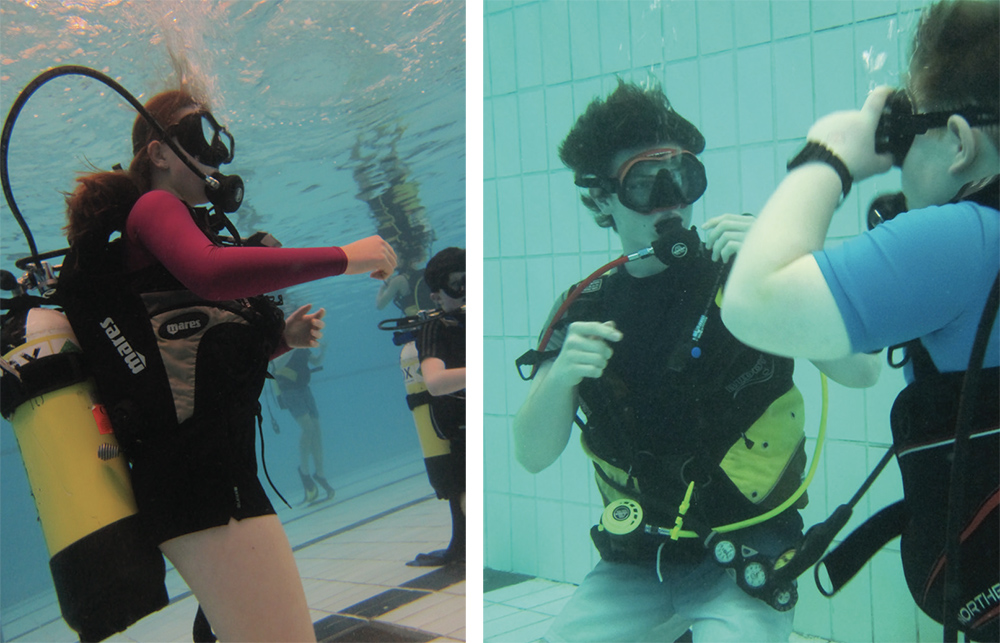
What would you like to celebrate after such a busy year?
Our main achievement in the past year has been to increase the number of junior divers in our club. Phoenix NW SAC celebrated its 30th anniversary in 2022. Even after 32 years, as a club we are keen to encourage all ages, genders and abilities to join us, to widen the number of people who enjoy diving and pass that on to a larger section of our local residents.
What are the club’s plans for the future?
In the next few years, we want to promote different types of diving: we hope to do some diving with a purpose. A weekend for more experienced divers to recover ghost nets has been proposed and is being investigated. While our senior members love passing on their knowledge to young people, they are keen to enjoy a mix of deeper wreck and scenic diving for their own experience and enjoyment. Trips to Scapa and the Western Isles are favourites. We want to retain our members and help them advance their diving skills and enjoyment, as well as recruiting new divers. We are putting up a new banner outside the pool where we’re based, leaving flyers in the reception areas and it has been suggested that we get some stickers for our cars and works vans. Watch this space!
Article ‘Club Focus – Phoenix NW Sub-Aqua Club’ by Kristina Pedder first published in SCUBA magazine, Issue 148 September 2024.
How do I find scuba diving near me?
If you want to learn to dive in West Lancashire with Phoenix NW Sub Aqua Club, please contact Brian Baker.



